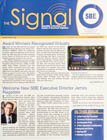|
It never occurred to me that I would be the recipient of the
John H. Battison Award for Lifetime Achievement.
Looking back, it all makes sense.
I knew John as a wonderful outgoing man.
He was a Spitfire pilot in the Battle of Britain
defending England from the Germans in World War Two.
Many died. I
am glad he lived to be a part of this great organization.
It must be in the genes.
My father started in radio broadcast engineering in the
mid-1920s at age seventeen.
I was born into the industry in 1947.
At age seven, I was learning Ohmís Law and turning the
knobs on our familyís 250-watt AM transmitter at WELY in Ely,
Minnesota. Then at age
seventeen, I completely wired KVBR Radio in Brainerd, MN, one of
our familyís new stations.
There was never a doubt that engineering was my life, not
just a job.
The only deviation from broadcast engineering came when I
enlisted in the U.S. Army in 1966 to complete my obligation to
our country. I
taught electronics and then was shipped off to Vietnam to do
electronic repair.
Back in the civilian life of radio broadcasting, I was at KVBR
doing engineering while going out to visit nearby stations to
find out how they ran. That led to me being hired as a
contractor to solve problems after the FCC deregulated the
requirement for stations to have a full-time engineer.
Appearance is important.
Showing off individuality in a working environment is not
good. I made it a
point to shave and bathe daily to be like management in a dress
shirt, but without a tie.
On an overnight job, I wore different clothes the second
day. Looking good
helped justify charging more than other engineers.
It seemed Iíd be a bachelor forever, but then Paula came along.
We were married and she brought legal secretary
experience to our business.
Working 40+ hours a week, Paula took care of the billing
and the books. She worked with clients on the phone and handled
orders along with shipping and receiving packages.
I was too busy to think about membership in the SBE and missed
the deadline to be grandfathered into the organization.
One trip was to the 50 KW
powerhouse WCCO Radio in Minneapolis.
Thatís when I met Chief Engineer Chuck Kunze.
He was a wealth of knowledge on how the big boys did
engineering. Chuck
was a mentor. One
thing led to another and he got me into the SBE, then gave me
the first exam back in 1983.
Moving up the ladder with more exams, it was CPBE, AMD,
CBNT and finally Life Membership.
The goal was to associate with like-minded people to talk
broadcast engineering.
AM radio has always been close to my heart.
I built five AM directional systems from the ground up
and installed more than forty C-QUAM AM stereo systems.
Participation in SBE or the industry did not stop after we shut
down our business when I was 70.
We had already been mentoring two radio broadcast
engineers before the SBE Mentor/Mentee Program began.
Joining that added two more to the list.
The National Radio Systems Committee AM Improvement
Working Group brought me into their fold.
It is volunteer work and feels good to give back to the
industry I grew up in.
The closest SBE chapter to my hometown of Brainerd, MN, is 125
miles south in the Twin Cities of Minneapolis and St. Paul.
Attending meetings there took an entire day so it didnít
happen often. One
SBE interaction was, and still is, the SBE HAMnet Chapter of the
Air, hosted by Hal Hostetler CPBE WA7BGX in Tucson, AZ.
It is an amateur radio gathering on 14.205 MHz on the
second Sunday of each month at 2400 GMT.
That helped with SBE
recertification points.
All broadcast engineers had amateur radio licenses in past
years. Those who are
not hams today may be missing the knowledge of how radio waves
propagate across all frequencies.
Seeing both sides of the radio frequency communications
equation has helped immensely in my career.
The ham radio hobby gives answers to otherwise sometimes
perplexing questions in commercial work.
It all makes sense.
Designing and building gadgets for stations was a fun part of my
lifeís work. That
included everything from digital timers to microphone
preamplifiers to headset amplifiers to microphone mute buttons.
Some of my designs wound up being manufactured, starting
with the Maxi-Tel Remote Broadcast Telephone, which later
evolved in the Zercom Max-Z and ZII.
I love to tell stories on the Tech Tips section on my
http://mwpersons.com
website.
Today with the threat of COVID, I attend SBE Twin Cities Chapter
17 monthly meetings via Zoom from my office.
That is convenient.
To my dismay, the annual chapter summer picnic, at the
Shoreview transmitter site, was cancelled this year.
I am looking forward to again seeing and talking with
engineers in person next summer.
Meanwhile, Radio World is running an article with more detail on
this story. Until then,
Iíll leave the soldering iron on for you. |



